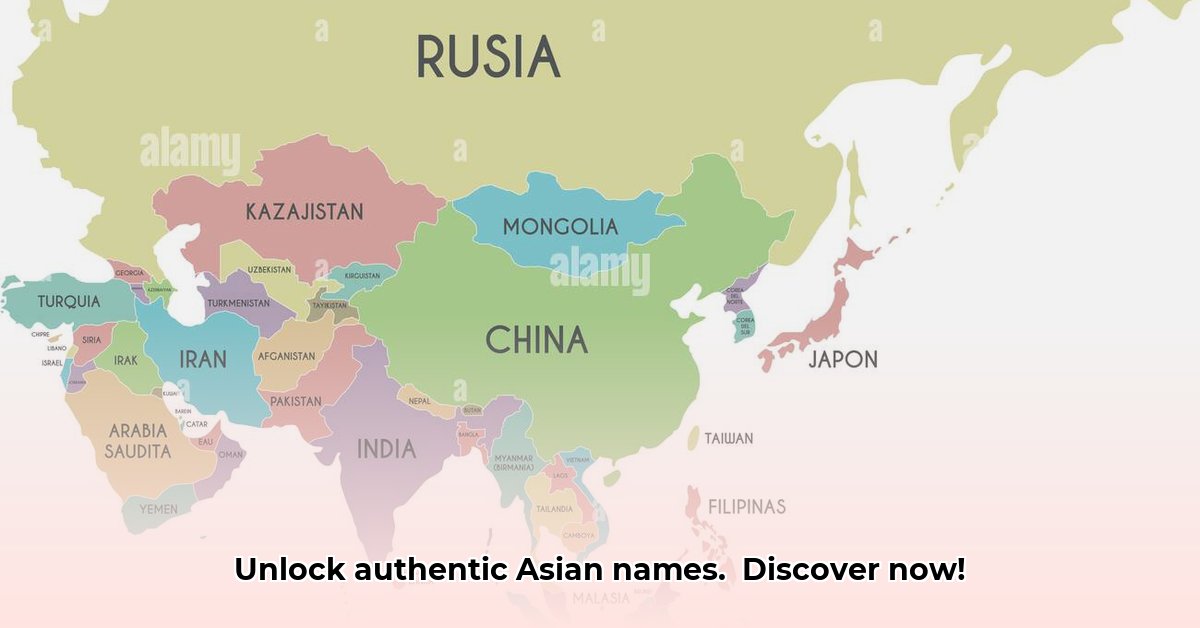Picking the right tool to generate Asian names can be tricky. Are you writing a book, working on a history project, or something else? This review will help you find the best name generator for your needs, while maintaining cultural sensitivity. We’ll look at different generators, compare how well they work, how accurate and respectful they are, and how easy they are to use, so you can choose names that are both good and culturally sensitive. Think of this as your guide to finding the perfect Asian name, ethically and responsibly. For similar name generation needs, you might also check out this Arabic name generator.
Asia Name Generators: Finding Culturally Appropriate Names
Choosing a name, especially one reflecting a rich Asian heritage, can feel like navigating a vast, beautiful landscape. Luckily, Asia name generators offer a shortcut—but not all are created equal. This review dives into the world of these digital tools, weighing their strengths and weaknesses to help you find the perfect name while respecting cultural nuances and exploring the ethical considerations involved with their use.
Accuracy and Cultural Sensitivity: More Than Just Sounds
Many online tools promise authentic-sounding Asian names. The reality, however, is mixed. Some generators truly shine, crafting names that resonate with the unique spirit of a particular culture. Others fall flat, producing generic or even stereotypical results. It’s like the difference between a perfectly seasoned dish and something that just tastes…off. Understanding regional variations is key to finding a relevant name.
What makes a generator tick? Data, mostly. Generators trained on vast, diverse datasets of actual names produce far more realistic results. Conversely, if the data pool is limited or biased—perhaps focusing solely on one region or neglecting less common names—the output will likely reflect these limitations, leading to inaccurate or potentially offensive results, undermining any perceived cultural authenticity.
Cultural sensitivity is crucial. A truly good generator avoids harmful stereotypes. It recognizes the incredible diversity within Asia, reflecting regional variations. Think of the differences between names in Northern and Southern China, or between Japan and Korea—each culture has its own unique naming traditions. Simply getting the sounds right isn’t enough; understanding the meaning and significance behind names adds a layer of authenticity that many generators overlook. Did you know that some Asian cultures place significant weight on the meaning of each character or syllable in a name? For instance, in some Chinese families, the number of strokes in a given name is carefully considered to ensure good fortune.
Choosing Wisely: A Guide to Responsible Selection
So, how do you find a name generator that’s both convenient and respectful? Here’s a checklist to guide your search:
- Data Transparency: A reputable generator will openly share its sources and methodology. This transparency builds trust and shows they’re not hiding anything. Are the datasets used diverse and representative of different Asian cultures?
- Cultural Consultation: Look for evidence that cultural experts or native speakers have contributed to the generator’s development. Their input ensures accuracy and minimizes the risk of unintentional misrepresentations. Were cultural advisors involved in the design and validation of the name generation process?
- Refined Options: The best generators offer fine-tuned controls—letting you specify the gender, region, or even the kind of meaning you’re looking for. This level of control is key to getting precise results. Can you filter names by origin, meaning, or historical period?
- Continuous Improvement: The field of AI (artificial intelligence) and cultural understanding is constantly evolving. A commitment to ongoing updates and improvements indicates a responsible generator that keeps learning and refining its approach. How often is the generator updated with new data and feedback?
Top Asia Name Generators: A Detailed Look
Several name generators offer diverse functionalities. Each has its unique strengths, catering to various user requirements. Here’s a detailed look at some of the best options available:
| Name Generator | Accuracy | Cultural Sensitivity | Ease of Use | Additional Features |
|---|---|---|---|---|
| Musely AI | High | High | High | Provides name meanings and origins; offers options for various Asian cultures. |
| Adazing’s Asian Name Generator | High | High | Medium | Allows users to specify gender and cultural background; offers a wide range of names. |
| Fantasy Name Generators (East Asian) | Medium | Medium | High | Focuses on fictional worlds based on East Asian cultures; good for creative projects. |
| Capitalize My Title | Medium | Low | High | Simple and easy to use, but lacks depth in cultural sensitivity and accuracy. |
| Remagine AI | High | Medium | High | Has a vast catalog of names; designed for creating believable characters. |
| NameGenerators.cc | Medium | Medium | High | AI-powered, provides names for fictional characters and pen names. |
Ethical Use: Beyond the Click of a Button
Responsible use of any tool is key, and name generators are no exception. Avoid using these tools to trivialize or misrepresent Asian cultures. Remember, names aren’t just random combinations of letters; they carry profound cultural significance and personal meaning. Should there be stricter regulations on the data used to train these generators? How can we prevent the misuse of these tools for insensitive or appropriative purposes?
These tools are meant to be helpful aids, not replacements for genuine cultural understanding. When utmost accuracy and respect are paramount—for instance, when creating a character in a novel or a film—seeking advice from cultural experts is always your best bet. Engaging with cultural communities offers invaluable insights.
The Future of Asia Name Generators: A Work in Progress
The field of AI (artificial intelligence) is constantly evolving, and we can expect to see significant improvements in Asia name generators in the years to come. Larger, more diverse datasets, smarter algorithms, and continuous feedback from cultural experts will lead to more refined and culturally sensitive results. Ultimately, the goal is to create tools that are both convenient and respectful of the rich tapestry of Asian cultures. The journey toward this goal is an ongoing process—researchers and developers are continually working to improve these technologies. What advancements in AI are most promising for improving the accuracy and cultural sensitivity of name generators?
Ethically Using Asian Name Generators for Fictional Characters
Key Takeaways:
- Asian name generators can be helpful starting points, but should not be solely relied upon.
- Always verify generated names using reputable resources and consider consulting cultural experts.
- Accuracy and cultural sensitivity are paramount; avoid perpetuating stereotypes.
Choosing the Right Tools: A Comparison
Let’s dive into the world of Asian name generators. How do you choose the right one? It’s not just about finding a tool with lots of random names. It’s about finding a tool that respects the richness and diversity of Asian cultures with an emphasis on cultural authenticity.
Consider these factors:
- Accuracy: Does the generator provide names that are actually used and reflect regional and temporal variations?
- Cultural Sensitivity: Does the generator avoid stereotypes or offensive terms, offering diverse options beyond common tropes?
- Ease of Use: Is the generator user-friendly and intuitive?
- Additional Information: Does the generator provide information on the origins and meanings of the names, giving context?
I’ve evaluated several online tools, and they differ dramatically. How can developers improve the algorithms to reduce bias? Regular audits and updates are essential.
| Name Generator | Accuracy | Cultural Sensitivity | Ease of Use | Additional Info |
|---|---|---|---|---|
| Adazing | High | High | Medium | High |
| CapitalizeMyTitle | Medium | Low | High | Low |
| Musely AI | High | High | High | Medium |
Remember, even the best generators are just tools. They’re not a replacement for genuine research and cultural understanding demonstrating how important it is to maintain oversight with AI-generated data. Always cross-reference the generated names with reliable sources.
Beyond the Generator: Ensuring Ethical Use
How to ethically use Asian name generators for fictional characters involves more than just picking a name. It’s about understanding the weight each name carries. Think of it as choosing the perfect paint for a masterpiece – the wrong color can ruin the whole picture. What long-term effects might these practices have on cultural perception?
Here’s a breakdown of ethical considerations:
- Research: Go beyond the generator. Explore databases, encyclopedias, and cultural resources specific to the region you’re writing about, exploring the history and meanings behind names.
- Diversity: Avoid relying on common or stereotypical names. Strive for diversity and authenticity. Asia isn’t monolithic; it hosts a rich tapestry of languages and cultures.
- Verification: Always double-check any names you select to ensure accuracy and cultural appropriateness, which is vital for avoiding mistakes.
- Meaningful Names: Consider how the name reflects the character’s personality, background, and role in the story.
- Sensitivity: Avoid names with potentially problematic connotations or negative associations in any culture. Remember, even subtle things can matter.
- Consult Experts: If uncertain, consult with people from the relevant cultural background. This adds an invaluable layer of authenticity and sensitivity.
The Importance of Cultural Nuances
The real challenge lies in understanding the subtleties unique to each culture. A name suitable for a character in South Korea may be completely inappropriate for a character in Thailand. Subtleties such as honorifics, surname significance, and regional variations play a critical role. The nuance lies in the details. Ignoring these details risks misrepresentation and cultural insensitivity. How can one stay current with these evolving cultural norms? Continuous learning and engagement with cultural communities are key
- King Names For Boy To Crown Your Little One With Power - January 30, 2026
- Discover Names with Specific Meanings for Your Baby - January 29, 2026
- Explore Weird Gender Neutral Names That Truly Stand Out - January 28, 2026








